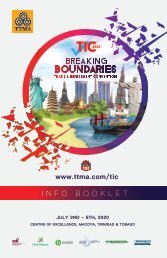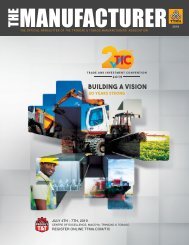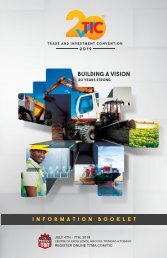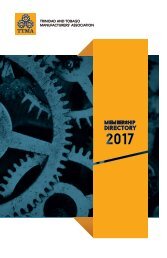The Manufacterer Newsletter 8.5 x 11 E-MAG
You also want an ePaper? Increase the reach of your titles
YUMPU automatically turns print PDFs into web optimized ePapers that Google loves.
Illicit<br />
Trade<br />
by Ismahieel Ali and Joy Francis<br />
As international trade has expanded<br />
dramatically in the 21st century, so too<br />
illicit trade has grown. <strong>The</strong> expansion<br />
of this trade has been to infiltrate the<br />
Caribbean region, and more specifically,<br />
Trinidad and Tobago has become the<br />
home to this type of trade. Everyday<br />
life is becoming seriously affected from<br />
counterfeit products to increasing drug<br />
crimes. <strong>The</strong> effects of this trade range<br />
from economic, environmental, and<br />
social and it is becoming challenging<br />
to curb its impacts.<br />
So what is illicit trade?<br />
<strong>The</strong> World Economic Forum (WEF)’s<br />
Global Agenda Council on Illicit Trade<br />
defines it as “involving money, goods or<br />
value gained from illegal and generally<br />
unethical activity. It encompasses a<br />
wide variety of illegal trading activities,<br />
including human trafficking, smuggling<br />
of excisable goods and trade in illegal<br />
drugs, as well as a variety of illicit<br />
financial flows”. While the definition is<br />
lengthy, it encapsulates the ‘meat’ of<br />
this trade. We are confronted by this<br />
trade every day.<br />
WEF continues to state that the “value<br />
of illicit trade – primarily the sale of<br />
counterfeit goods – is estimated<br />
at US$ 650 billion worldwide. If we<br />
include money laundering, the number<br />
jumps to an astonishing US$ 2 trillion,<br />
compared to a legitimate global trade<br />
figure of about US$ 10 trillion. <strong>The</strong> illicit<br />
economy is, worryingly, truly vast”. This<br />
statement from WEF is profound to say<br />
the least and TTMA is of the belief that<br />
this type of trade is becoming more<br />
prominent in our jurisdiction and the<br />
catastrophic effects are widespread.<br />
<strong>The</strong> worrying fact is that there is limited<br />
information on this type of trade and<br />
this need to change.<br />
<strong>The</strong> impacts are farreaching…<br />
As previously stated, the risks are<br />
economic, environmental and social.<br />
Firstly, illicit trade and financial flows<br />
reroute money from the legitimate<br />
economy. Environmentally, some of<br />
these trades reduce natural resources<br />
or have other environmentally negative<br />
effects. Socially, the impacts are<br />
enormous. <strong>The</strong>re are the direct effects<br />
of human trafficking and the harm<br />
caused by counterfeit drugs and<br />
medicines.<br />
As previously stated, the impacts are<br />
far–reaching affecting all areas of the<br />
economy and society. For example,<br />
illicit trade and financial flows reroute<br />
money from the legitimate economy. In<br />
a nutshell, illicit financial flows (money<br />
gained from illegal means) are seen<br />
as a major economic impediment<br />
to sustainable development since<br />
exorbitant losses are expected since<br />
a country as a whole and businesses<br />
lose income investment, markets<br />
and legitimacy; and populations are<br />
marginalized and exposed to health<br />
risks. As the saying goes, this is the tip<br />
of the iceberg…<br />
Research in the area of illicit<br />
financial flows generated by one key<br />
transnational organized crime sector,<br />
the global market for cocaine, was<br />
14
















